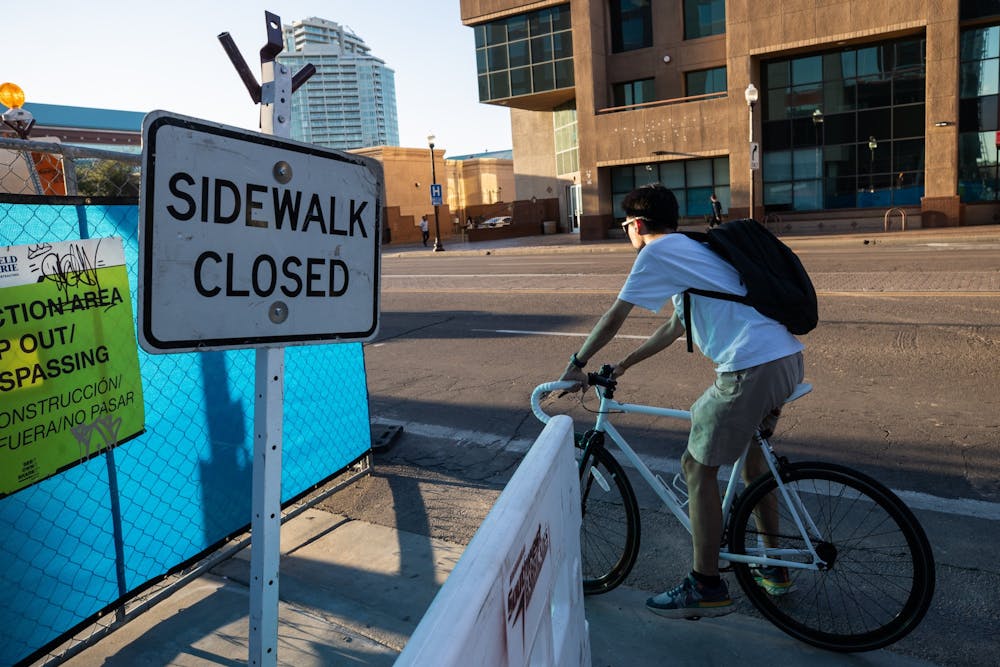Every ASU student knows it: If you ride a bike to campus, bring a lock, and even then, be prepared to come back from class with it stolen.
It happened to Sara Hambleton last month. Hambleton, a sophomore studying marketing, parked her bike outside of the Sun Devil Fitness Complex to go to work. She locked it up using U-lock, considered to be the more secure lock for bikes.
She came back 40 minutes later; the bike was gone.
Stories like Hambleton’s are common.
This semester alone, 118 incidents of bike theft were reported to the ASU Police Department, according to the University's crime logs. Since 2017, 83 bikes have been reported stolen through Project 529, an organization working to prevent bike thefts partnered with the University.
Rob Brunt, chief outreach officer for Project 529 Garage, first met with ASU PD in June 2017. When he learned of the high level of bike thefts the campus was experiencing, he worked to begin their partnership.
Students can register with the free 529 Garage app, which creates a tamper-proof sticker with seven characters unique to each bicycle, like a license plate. Students can also upload photos so that if others see the bike online or someone riding it, they can alert the student. Every app user within 20 miles receives a notification when the stolen bike alert is set off, including bikes registered to a specific college campus.
Since the partnership with the University started, 1,376 bikes have been registered with Project 529 and 83 bikes have been reported stolen through the system, an ASU spokesperson said in an email.
READ MORE: Records show lowest number of bike thefts at ASU in years
Most police departments and college campus bike registers have isolated information that only they can access to try and recover stolen bikes, while the 529 Garage app brings the cycling community together to be on the lookout for a stolen bicycle, Brunt said.
Since the start of Project 529's partnership with ASU, only two stolen bicycles have been returned to their owners.
Cycling is the only form of transportation that does not have a number attached to it; there is no industry standard for serial numbers, which makes it hard to identify bikes and easy to steal, Brunt said.
If other cyclists see the bike when stolen, they can report it, and police receive the information along with bike shops in the area that can search the Project 529 stolen database if the thief tries to sell the bike, Brunt said.
There is a fee for university campuses like ASU to use the system, based on the population of the school, Brunt said.
ASU PD was able to transfer all of their information from the old system they used where you could only register your bike to the campus, instead of the surrounding area, Brunt said.
“This winter we're really going to focus on (Tempe) neighborhoods,” Brunt said. “We had conversations with all of the agencies surrounding the campus, so we need to follow up with that.”
Often, because of a lack of coordination between agencies, such as police departments, less than 1% of bikes get back to their owners, Brunt said.
“You can basically go on Craigslist, throw your stolen bike up there and sell it within a few hours,” Brunt said.
After reporting the theft to ASU PD, Hambleton, who was registered with the app, became aware that there are no cameras outside the SDFC, even though officers know it is a high-theft area. Almost all of her coworkers have also experienced bike theft, Hambleton said.
Steven Felix, a junior studying technological leadership, had his bike stolen outside of Wrigley Hall when he returned to it after class. A month later, he's yet to recover it.
“I filed a police report but nothing has come up. (ASU PD) said it’s their number one issue on campus and that the odds of recovering my bike are slim to none,” Felix said in a text message.
Felix did not think his bike would be stolen in broad daylight, and he never registered it with Project 529.
"Although thieves tend to strike during hours when less people are on campus or in areas with little foot traffic, that’s not always the case," the ASU spokesperson said in the email. "Sometimes they do it in broad daylight in areas where other people are walking by."
Given the frequency of the thefts, many ASU students feel the University should be doing more to protect bikes on campus from being stolen in the first place.
Ken Wang, a senior studying computer science, said in an email that ASU could easily install a security camera system around bike racks.
“It seems like ASU doesn't care much about the bike theft issue even though they can easily help solve the problem,” Wang said
Additional ways to combat bike theft
Bike Saviours Bicycle Collective, a nonprofit in Tempe, shows bikers that come into the shop how to lock their bike, where to lock it, as well as other methods they can use to deter a thief, said Nicole Muratore, manager of the shop.
Bike Saviours recommends registering bikes with the 529 Garage app, Muratore said.
“We encourage everyone bringing a bike to campus to get it registered. That way if it’s stolen and recovered we can return it to the owner. We also encourage everyone to review the bike info and tips provided on this page,” the University spokesperson said.
It is recommended online to use a U-lock with a safe gauge in the rear triangle of the bike, to protect the wheel and the frame, and a cable or a second U-lock is recommended to protect the front wheel, Muratore said.
However, “no lock is going to be foolproof, if somebody wants to get through it, they will,” Muratore said.
“Bikes are the only way that some people can mobilize themselves because they are unhoused or they can’t afford a car,” Muratore said. “So, when someone’s bike goes missing or it is in a state of disrepair, they are put in a desperate situation.”
Edited by Jasmine Kabiri, Wyatt Myskow and Kristen Apolline Castillo.
Reach the reporter at abickle@asu.edu and follow @AlyssaBickle1 on Twitter.
Like The State Press on Facebook and follow @statepress on Twitter.

Alyssa Bickle is a staff reporter, writing for the community and culture desk. She is a writing tutor for University Academic Success Programs, and a fellow in the Center for the Study of Religion and Conflict. She is pursuing bachelors degrees in journalism and political science.




